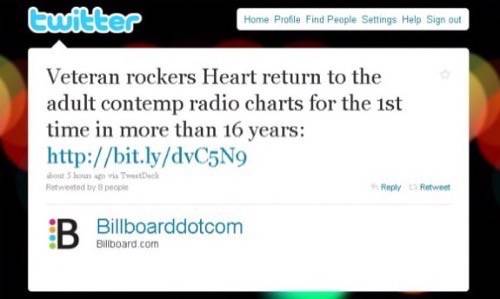Billboard is best known for charts that rank the most popular music and musicians, which the weekly industry magazine started publishing in 1913 as a list of the most popular sheet music. Since then, topping the Billboard Hot 100 has become a coveted milestone for musicians, but the Billboard brand has lost some of its critical cache in recent decades, just as record companies saw their influence decline with the rise of the Internet.

But it’s clear Billboard knows it will lose relevance fast unless it can establish itself as an authority on music and the digital frontier.
Billboard Magazine recently published a cover story on the best ten music startups of 2010, and the company, which includes Billboard Magazine, Billboard Events and Billboard.com, is hosting its first “Music App Awards” at something called “Billboard’s Mobile Entertainment Live!: The Music App Summit.” Both lists, and the company’s careful emphasis on Billboard.com as an entity separate and edgier than its print product, seem like a play at securing Billboard’s reputation as the arbiter of what’s important in music today.

Billboard’s Hot 100 and other lists are still coveted symbols for artists and labels. But the company has challengers on all sides from the iTunes and Last.fm charts as well as digital review sites like Pitchfork Media and Hype Machine. At least one company is challenging Billboard’s authority with a list it calls the Ultimate Chart that factors in more modern metrics such as ringtone sales and how many times a song is streamed. (Although this list proved less than earth shattering – see our coverage, Is Ultimate Chart Overhyped?)
Billboard is ultimately a trade publication aimed at industry insiders – many of whom are groping for an authority on what’s popular after the record sales-driven revenue apocalypse. So it’s crucial for it to have an accurate read on what’s popular and therefore monetizable, and it’s not unthinkable that it might succeed. Billboard has innovated with its charts over the years and the company says single sales and online streaming are now factored into its rankings along with radio airplay and album sales.
Billboard.com even tracks the top 40 “digital songs” as measured by paid downloads across genres. But this chart is arguably already losing relevance as more artists release their music digitally online for free.
What do you think – can the 116-year old, mainstream company get its groove back in a time when most of the trends in music are in the direction of digital and underground? Are efforts like the Music App Awards smart – or doomed?

















